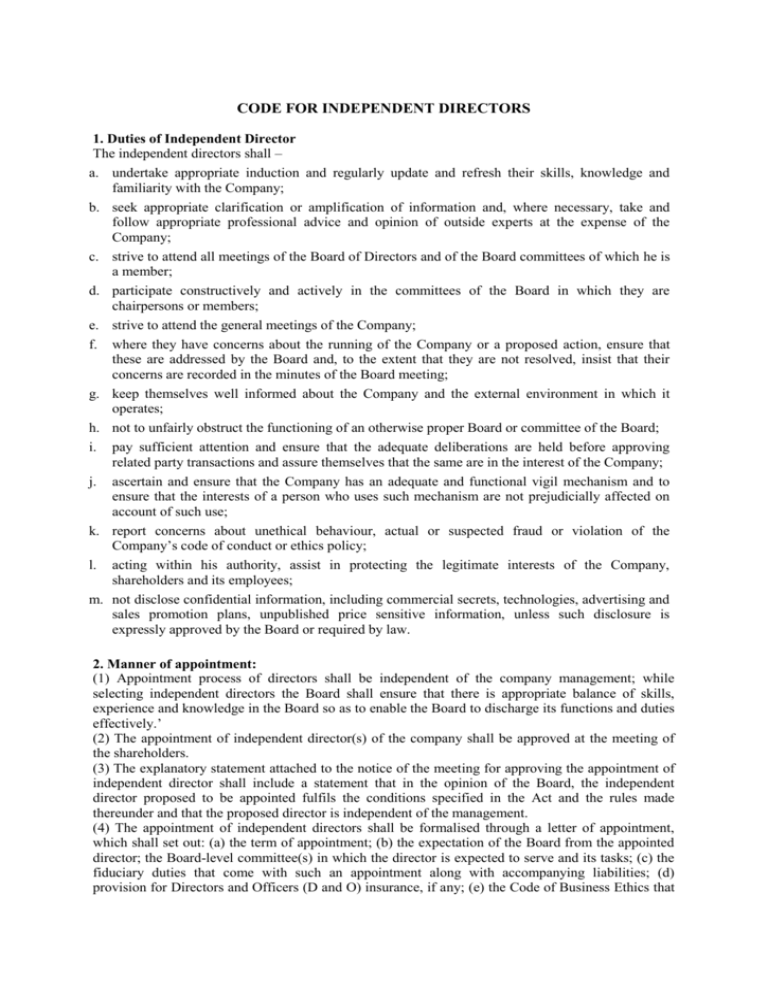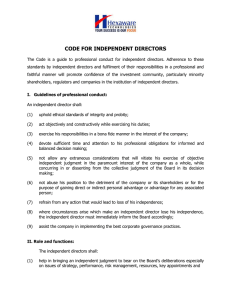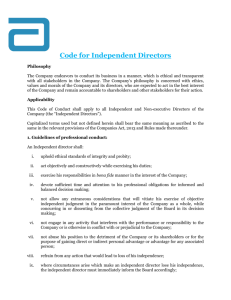Code for Independent Director
advertisement

CODE FOR INDEPENDENT DIRECTORS 1. Duties of Independent Director The independent directors shall – a. undertake appropriate induction and regularly update and refresh their skills, knowledge and familiarity with the Company; b. seek appropriate clarification or amplification of information and, where necessary, take and follow appropriate professional advice and opinion of outside experts at the expense of the Company; c. strive to attend all meetings of the Board of Directors and of the Board committees of which he is a member; d. participate constructively and actively in the committees of the Board in which they are chairpersons or members; e. strive to attend the general meetings of the Company; f. where they have concerns about the running of the Company or a proposed action, ensure that these are addressed by the Board and, to the extent that they are not resolved, insist that their concerns are recorded in the minutes of the Board meeting; g. keep themselves well informed about the Company and the external environment in which it operates; h. not to unfairly obstruct the functioning of an otherwise proper Board or committee of the Board; i. pay sufficient attention and ensure that the adequate deliberations are held before approving related party transactions and assure themselves that the same are in the interest of the Company; j. ascertain and ensure that the Company has an adequate and functional vigil mechanism and to ensure that the interests of a person who uses such mechanism are not prejudicially affected on account of such use; k. report concerns about unethical behaviour, actual or suspected fraud or violation of the Company’s code of conduct or ethics policy; l. acting within his authority, assist in protecting the legitimate interests of the Company, shareholders and its employees; m. not disclose confidential information, including commercial secrets, technologies, advertising and sales promotion plans, unpublished price sensitive information, unless such disclosure is expressly approved by the Board or required by law. 2. Manner of appointment: (1) Appointment process of directors shall be independent of the company management; while selecting independent directors the Board shall ensure that there is appropriate balance of skills, experience and knowledge in the Board so as to enable the Board to discharge its functions and duties effectively.’ (2) The appointment of independent director(s) of the company shall be approved at the meeting of the shareholders. (3) The explanatory statement attached to the notice of the meeting for approving the appointment of independent director shall include a statement that in the opinion of the Board, the independent director proposed to be appointed fulfils the conditions specified in the Act and the rules made thereunder and that the proposed director is independent of the management. (4) The appointment of independent directors shall be formalised through a letter of appointment, which shall set out: (a) the term of appointment; (b) the expectation of the Board from the appointed director; the Board-level committee(s) in which the director is expected to serve and its tasks; (c) the fiduciary duties that come with such an appointment along with accompanying liabilities; (d) provision for Directors and Officers (D and O) insurance, if any; (e) the Code of Business Ethics that the company expects its directors and employees to follow; (f) the list of actions that a director should not do while functioning as such in the company; and (g) the remuneration, mentioning periodic fees, reimbursement of expenses for participation in the Boards and other meetings and profit related commission, if any. (5) The terms and conditions of appointment of independent directors shall be open for inspection at the registered office of the company by any member during normal business hours. (6) The terms and conditions of appointment of independent directors shall also be posted on the company's website. 3. Re-appointment: The re-appointment of independent director shall be on the basis of report of performance evaluation. 4. Resignation or removal: (1) The resignation or removal of an independent director shall be in the same manner as is provided in sections 168 and 169 of the Act. (2) An independent director who resigns or is removed from the Board of the company shall be replaced by a new independent director within a period of not more than one hundred and eighty days from the date of such resignation or removal, as the case may be. (3) Where the company fulfils the requirement of independent directors in its Board even without filling the vacancy created by such resignation or removal, as the case may be, the requirement of replacement by a new independent director shall not apply. 5. Separate meetings: (1) The independent directors of the company shall hold at least one meeting in a year, without the attendance of non-independent directors and members of management; (2) All the independent directors of the company shall strive to be present at such meeting; (3) The meeting shall: (a) review the performance of non-independent directors and the Board as a whole;









